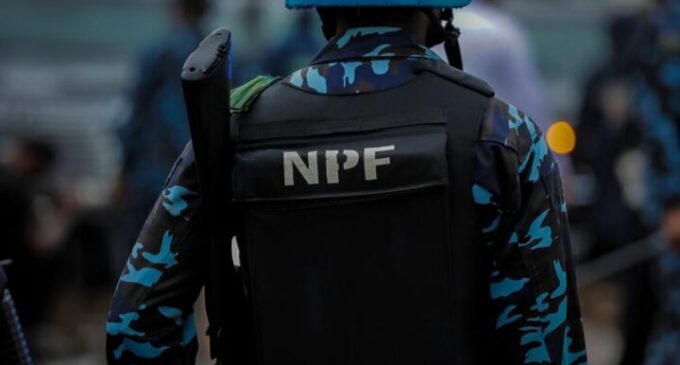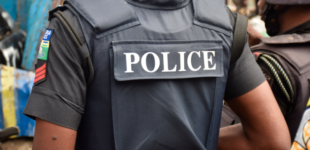Not for the faint of heart: Policing the Nigeria Police

On January 13, 1970, Olusegun Obasanjo, army colonel and General Officer Commanding (GOC) the Third Marine Commando Division of the Nigerian Army, arrived in Amichi in the old Nnewi division of what was then known as East Central state to accept the capitulation of Biafra from Phillip Effiong, interim leader of the enclave. The encounter occurred in the house of Chief Ben Atuchukwu, one of a pioneer generation of trading magnates whose exploits bestowed on Nnewi its reputation as the home of Nigerian enterprise.
Present in the room was Simon Nsobundu Okeke, a pioneer estate surveyor and valuer with origins in Amichi, who was a senior official in Biafra’s security services. Ben Atuchukwu, the man in whose house the war ended, was his paternal uncle. In the nature of the occasion, Okeke and Obasanjo were not introduced to one another on the day.
After the war, Obasanjo continued in the military, becoming in succession a cabinet minister, second-in-command to the head of state, military head of state, civilian president, and international statesman. For his part, Okeke returned to his vocation of estate management, rising to become an acknowledged leader among estate surveyors and valuers in the country.
Nearly 32 years after they first met, the destinies of both men would be joined in the most unpredictable fashion. Obasanjo was sworn in on May 29, 1999, for his second tour of duty as Nigeria’s leader. Two and a half years later, on November 28, 2001, he presided as Chief Okeke took the oath of office as chairman of the Police Service Commission (PSC), along with six other commissioners. In assuming this office, Chief Okeke became the first chair of the commission in 22 years, dating back to October 1979.
Published by MayFive Media Limited, ‘Policing the Nigeria Police’ is Chief Okeke’s timely and thoughtful retrospective on policing and the Nigeria Police Force (NPF). It is part memoir and part policy memo in a book that combines racy narrative with deliberative analysis, juxtaposing recall of the worst of bureaucratic and political skullduggery with high-minded invocations of the public interest.
The book unfolds in 15 chapters that address different aspects of the institutional evolution, bureaucratic machinations, relational episodes, and, reform proposals in policing and police oversight viewed from the vintage of Chief Okeke’s tenure and experience with the PSC. Some of the major themes addressed include the histories of the NPF and PSC and of presidential and political instrumentalisation of both; abuses of the roles and powers of the IGP and of the president; the role of the PSC in election monitoring; the role of the president in a transitional democracy; the travails of civilian oversight of the security services; and issues of police reform, including state police and community policing.
By way of context, the Metropolitan Police in England was a mere 32 years old when the British began the experiment that evolved into the NPF. Until the departure of the British in 1960, the NPF was under the political authority of the head of the colonial government, for the most part, known as the governor, who directed the force at his whim.
As they retreated in 1960, the British bequeathed to the country a PSC as a civilian oversight body over the NPF. This was problematic because for a century until then, the NPF had known no such oversight nor imbibed any bureaucratic traditions that would prepare it for such. Yet they gave this oversight body extensive powers of appointment, promotion, and discipline over the NPF.
For 19 years, until 1979, the PSC persevered with some difficulty, coexisting uneasily with the regimental mentality of military rule for about 13½ years of those. Upon the transition to the presidential system of government, from October 1, 1979, the constitution made the president ex-officio chairman and chief executive of the PSC. 39 months later, General Muhammadu Buhari abrogated that constitution.
The return of military rule had a profound impact on the PSC and on the idea of police oversight. For the duration of the Buhari regime, Tunde Idiagbon, the brigadier-general who was second-in-command, served as the nominal chair of the PSC. Ibrahim Babangida, who overthrew Buhari in August promulgated the Police (Miscellaneous Provisions) Decree, No. 5 of February 6, 1989, which abrogated the PSC, making this retrospective to the beginning of his regime on August 27, 1985. In its place, he established a police council, whose membership comprised the military president, all state governors, and the Inspector-General of Police. At the time, the military president appointed all state governors. As such, the Police Council comprised the president and his appointees, all of whom came from regimental traditions.
In the 41 years since its creation in 1960 until 2001, therefore, the PSC was not in existence for 14 years; notionally existed under military rule for another 13½ years; and only functioned under civil rule for nine and a half (9½) years. For four of those nine and a half years, the president also chaired the commission. This chequered history did not equip the commission with any institutional memory. At its inauguration in 2001, it had no office or staff. The 1999 constitution had also re-designed the commission in one fundamental way: unlike the period until 1985, it placed the Inspector-General of Police (IGP) outside the powers and purview of the PSC.
Under the constitution, the president appoints the IGP, controls and instructs him and can also fire him at will. The IGP commands the NPF. The Police Council, whose membership comprises the president, state governors and the chairman of the PSC, coexists with the commission. Its role is confined to the declared purpose of advising the president in the appointment of the IGP. Chief Okeke recalls no such process as having taken place in his five years on the council, which he describes as “next to moribund”.
The result was two-fold. First, in 2001, both the presidency and the IGP were unused to the idea of independent civilian oversight. Second, when he assumed office in 2001 as the chair of the PSC, Chief Okeke was in a unique pickle: he had no predecessor from whose experience he could draw but he was up against an institution and officers with fond memories of the days when the NPF brooked no oversight and was the plaything of the president.
Over five years in the role of PSC chairman, Chief Okeke worked with one president and three IGPs: the first was fired, the second was convicted for fraud and embezzlement, and the third, as Chief Okeke writes, “practically shoved aside the Police Service Commission and took directives only from the President”. With few allies, the job of the PSC Chairman verged on impossible. It was just not for the faint of heart.
At the end of his tenure in 2006, Chief Okeke chose wisely not to seek reappointment. Unknown to him, the Inspector-General of Police, Sunday Ehindero, had advocated with and advised the president that it was better to have the PSC headed by a retired police officer. In February 2023, President Obasanjo, who implemented this advice, admitted it was mistaken, saying: “When you make a retired police officer the head of the PSC, it is like asking a thief to catch a thief”.
But this mistake birthed a Nigerian tradition; since 2006, the PSC has been retirement home to a succession of former IGPs. Far from making the relationship better, this deepened antipathy between the PSC and the NPF, introducing the added complication of interpersonal psycho-drama between incumbent IGPs on the one hand, and former IGPs who were their superiors on the other. The case between the IGP and the PSC over the question of primacy in the matter of recruitment of police personnel is pending at the supreme court.
This then is the narrative of interlocked and overlapping destinies and mutating machinations that make ‘Policing the Nigeria Police’ such a compelling read. The book offers thoughtful insights into policing for the country and argues a persuasive case for the decentralisation of the NPF, dispassionately examining proposals for state police, community policing, and even vigilantes. Anyone interested in making policing both effective and accountable in Nigeria has a duty to read it.
A lawyer and a teacher, Odinkalu can be reached at [email protected]
Views expressed by contributors are strictly personal and not of TheCable.
















There are no comments at the moment, do you want to add one?
Write a comment